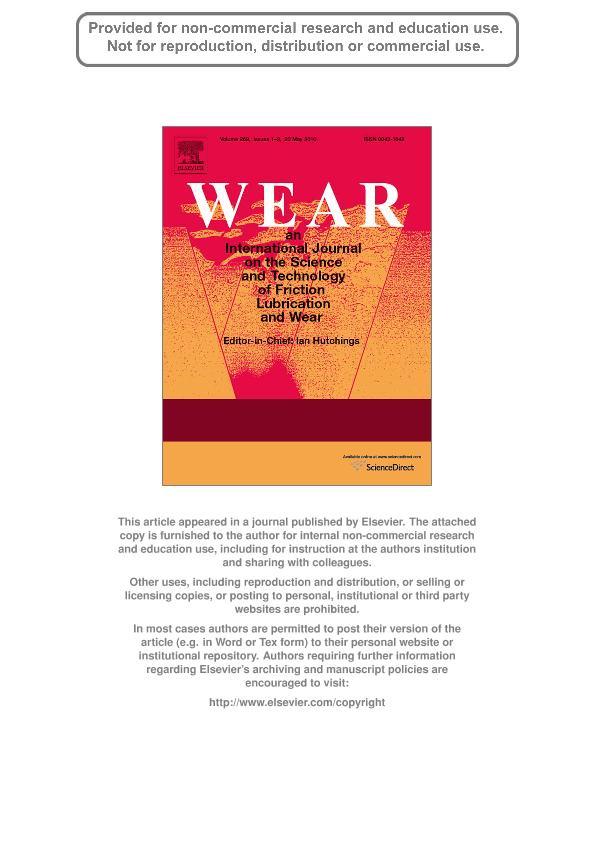Mostrar el registro sencillo del ítem
dc.contributor.author
Pettarin, Valeria

dc.contributor.author
Churruca, María José

dc.contributor.author
Felhös, David
dc.contributor.author
Karger-kocsis, Joseph
dc.contributor.author
Frontini, Patricia Maria

dc.date.available
2017-08-25T18:38:37Z
dc.date.issued
2010-05-15
dc.identifier.citation
Pettarin, Valeria; Churruca, María José; Felhös, David; Karger-kocsis, Joseph; Frontini, Patricia Maria; Changes in tribological performance of high molecular weight high density polyethylene induced by the addition of molybdenum disulphide particles; Elsevier Science Sa; Wear; 269; 1-2; 15-5-2010; 31-45
dc.identifier.issn
0043-1648
dc.identifier.uri
http://hdl.handle.net/11336/23008
dc.description.abstract
Through this work, the effect of the addition of commercial molybdenum disulphide on the tribological behavior of high molecular weight high density polyethylene was assessed. Determination of several tribological parameters (kinetic coefficient of friction by sliding testing, static coefficient of friction by scratch testing, sliding wear rate by roller-on-plate test, abrasive wear rate by dry sand/rubber wheel test, and surface hardness by microhardness measurements) and microscopical observations (by TOM, SEM and EDAX) were combined in an attempt to elucidate the effect of MoS2 in composites performance. In this way, a complete picture of composites behavior was achieved. An content of MoS2 for minimum wear rate was encountered to be around 10 wt.%. It was found that the solid lubricant increases wear resistance under both sliding and abrasive wear conditions. It seems that depending on wear condition MoS2 acts in a different way. It appears that MoS2 contributes to dissipate the generated heat, thus decreasing wear due to surface melting of the polymer. Under sliding conditions, an adhesive wear mechanism became dominant which is characterized by the formation of a uniform and adherent transfer film on the counterface. Under abrasive conditions a positive rolling effect of MoS2 particles was found. Amounts of filler larger than 10% resulted in a detriment of wear resistance due to weak microstructures which lead to the occurrence of micro-cracking wear mechanism. Besides, the effect of MoS2 particles upon HMW-HDPE stress–strain and fracture behavior was checked for the composite with the best wear performance. Low strain mechanical properties of HMW-HDPE remained almost unaltered while a noticeable change in high strain properties resulted from the introduction of filler. Fracture mode was also changed from stable to unstable under quasi-static conditions and from semi-ductile to brittle under dynamic conditions, with a concomitant abrupt reduction in toughness values.
dc.format
application/pdf
dc.language.iso
eng
dc.publisher
Elsevier Science Sa

dc.rights
info:eu-repo/semantics/openAccess
dc.rights.uri
https://creativecommons.org/licenses/by-nc-sa/2.5/ar/
dc.subject
Polymer–Matrix Composite
dc.subject
Lubricant Additives
dc.subject
Sliding Wear
dc.subject
Three-Body Abrasion
dc.subject
Stress–Strain Behavior
dc.subject
Fracture Toughness
dc.subject.classification
Compuestos

dc.subject.classification
Ingeniería de los Materiales

dc.subject.classification
INGENIERÍAS Y TECNOLOGÍAS

dc.title
Changes in tribological performance of high molecular weight high density polyethylene induced by the addition of molybdenum disulphide particles
dc.type
info:eu-repo/semantics/article
dc.type
info:ar-repo/semantics/artículo
dc.type
info:eu-repo/semantics/publishedVersion
dc.date.updated
2017-05-09T19:37:39Z
dc.journal.volume
269
dc.journal.number
1-2
dc.journal.pagination
31-45
dc.journal.pais
Países Bajos

dc.journal.ciudad
Amsterdam
dc.description.fil
Fil: Pettarin, Valeria. Consejo Nacional de Investigaciones Científicas y Técnicas. Centro Científico Tecnológico Conicet - Mar del Plata. Instituto de Investigaciones En Ciencia y Tecnología de Materiales. Universidad Nacional de Mar del Plata. Facultad de Ingeniería. Instituto de Investigaciones En Ciencia y Tecnología de Materiales; Argentina
dc.description.fil
Fil: Churruca, María José. Consejo Nacional de Investigaciones Científicas y Técnicas. Centro Científico Tecnológico Conicet - Mar del Plata. Instituto de Investigaciones En Ciencia y Tecnología de Materiales. Universidad Nacional de Mar del Plata. Facultad de Ingeniería. Instituto de Investigaciones En Ciencia y Tecnología de Materiales; Argentina
dc.description.fil
Fil: Felhös, David. University Of Miskolc; Hungría
dc.description.fil
Fil: Karger-kocsis, Joseph. Tshwane University Of Technology; Sudáfrica
dc.description.fil
Fil: Frontini, Patricia Maria. Consejo Nacional de Investigaciones Científicas y Técnicas. Centro Científico Tecnológico Conicet - Mar del Plata. Instituto de Investigaciones En Ciencia y Tecnología de Materiales. Universidad Nacional de Mar del Plata. Facultad de Ingeniería. Instituto de Investigaciones En Ciencia y Tecnología de Materiales; Argentina
dc.journal.title
Wear

dc.relation.alternativeid
info:eu-repo/semantics/altIdentifier/url/http://www.sciencedirect.com/science/article/pii/S0043164810001092
dc.relation.alternativeid
info:eu-repo/semantics/altIdentifier/doi/http://dx.doi.org/10.1016/j.wear.2010.03.006
Archivos asociados
